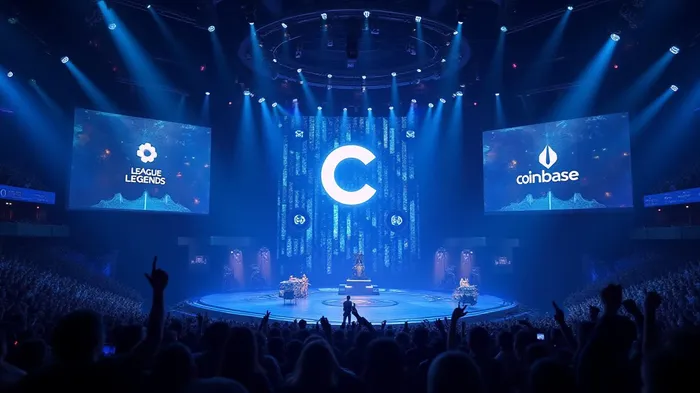Coinbase and Riot Games Forge Blockchain-Powered Esports Future Amid Regulatory Crosscurrents
The esports industry is on the brink of a technological revolution. On May 6, cryptocurrency giant CoinbaseCOIN-- announced a landmark partnership with Riot Games, the developer behind League of Legends and VALORANT, to integrate blockchain technology into major esports events. This move signals a bold expansion into fan engagement and digital ownership—a shift that could redefine how billions of dollars flow through the gaming economy.

A Blockchain Gamble with Mass Appeal
The Coinbase-Riot alliance targets two core audiences: casual fans and hardcore enthusiasts. For the former, initiatives like exclusive "Econ Report" and "Gold Grind" segments will demystify in-game economics, turning passive viewers into engaged analysts. For the latter, the partnership promises tokenized rewards—a nascent concept where digital assets like emotes or tournament access are stored on blockchain ledgers, ensuring scarcity and provable ownership.
The stakes are high. Riot’s League of Legends draws 100 million monthly players, while VALORANT’s fanbase grew 40% in 2024. Coinbase, meanwhile, seeks to leverage this audience to boost its crypto exchange’s relevance in a stagnant market.
COIN’s 7% jump on May 6 suggests early investor optimism about the deal’s potential.
Regulatory Shadows Loom Over Blockchain Ambitions
While Coinbase’s vision is bold, the crypto industry’s regulatory hurdles remain glaring. Just weeks before the announcement, the SEC secured a $576,109 judgment against Live Out Loud, Inc. (LOL), a firm accused of unregistered securities sales and misleading marketing. This case underscores the risks of untested digital asset models—risks that could spill over into esports.
Riot’s own track record offers cautious optimism. The company has navigated controversies like leadership shakeups (e.g., Hoby Darling’s April 2025 promotion to President) and esports scheduling challenges. Yet its financial clout—backed by Tencent’s $44 billion market cap—gives it room to experiment.
Tencent’s steady growth reflects investor confidence in its gaming and tech holdings, including Riot Games.
Betting on Blockchain’s Long Game
The Coinbase-Riot partnership’s success hinges on execution. Early wins could include:
- Fan retention: Tokenized rewards might boost attendance at events like the VCT Masters Toronto (June 7–15), where Coinbase’s hospitality programs debut.
- New revenue streams: Blockchain-based microtransactions or collectibles could add $100–200 million annually to Riot’s esports revenue, which already tops $500 million.
Yet challenges loom. Regulatory scrutiny of crypto assets, especially in the U.S., could limit reward distribution. Meanwhile, rival platforms like FanToken (backed by Atari) are already testing blockchain-based fan tokens.
Conclusion: A High-Reward, High-Risk Gamble
The Coinbase-Riot deal represents a strategic bet on blockchain’s potential to transform esports into a $20 billion industry by 2028. For investors, the partnership offers two clear entry points:
1. COIN shares, which could rise if the alliance drives crypto adoption among mainstream gamers.
2. Tencent stock, which benefits from Riot’s growth and its ability to navigate regulatory minefields.
However, the SEC’s crackdown on Live Out Loud serves as a reminder: innovation in digital assets demands both technical brilliance and legal agility. Investors should watch closely as this partnership unfolds—a success could catalyze a new era of blockchain-driven entertainment, while missteps might cement crypto’s reputation as a high-risk arena for casual fans and financiers alike.
Tracking the pulse of global finance, one headline at a time.
Latest Articles
Stay ahead of the market.
Get curated U.S. market news, insights and key dates delivered to your inbox.

Comments
No comments yet